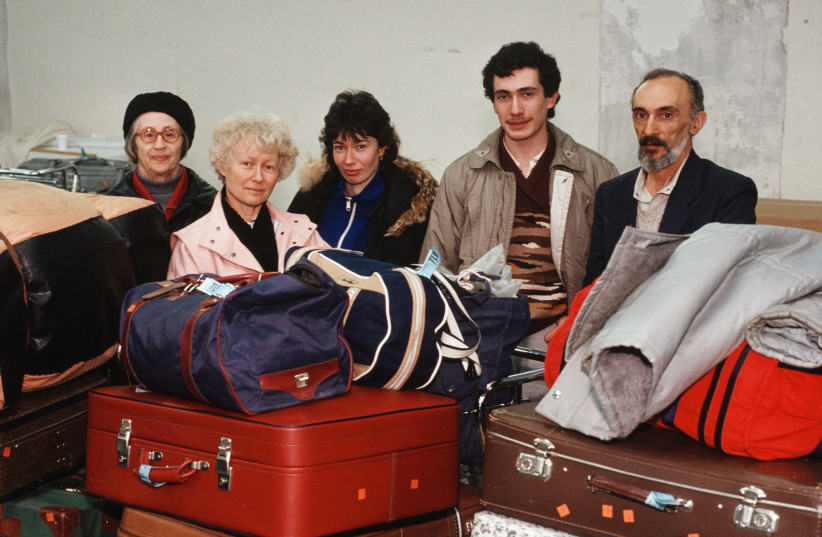Since the Russo-Ukrainian conflict, many prominent Russian Jewish businesspeople have sought refuge in countries like the UAE, Turkey, and Israel. These countries have openly welcomed this new wave of immigrants, recognizing the business and philanthropy they bring. Except, it seems, for Israel.
Many of these individuals, in fact, hold Israeli citizenship and the desired blue Israeli passport, until recently Israel notified them of the cancellation of their passports.This was done arbitrarily by running the list of olim chadashim (new immigrants) through an algorithm that was created by the immigration authority.
Sadly, even after the October 7 massacre, as all Israelis witnessed the unfortunate and disturbing lack of support our country received, even from Western nations, we still haven’t fully grasped the importance of securing every form of support that Israel and the global Jewish community can count on.
In fact, the discussion in the Israeli media about Russian Jews receiving Israeli citizenship has, for years, carried a hint of racism.
They were labeled as not Jewish enough, and their loyalty was questioned from time to time. At the same time, financial and public support from American Jewish philanthropists or Christian Zionists is always welcomed without hesitation—and for good reason.

Libel leads to backfire
One of the media campaigns with a strong smell of racism started in 2020 with a report by Raviv Druker on Channel 13. He reported that a policy change in 2017, which allowed new immigrants to receive an Israeli foreign passport upon arrival rather than having to wait a year, had been exploited by Jewish celebrities and businessmen from Russia.
Furthermore, Druker, usually one of the most outspoken critics of so-called “religious coercion” in Israel, hinted that some of the recipients from Russia were not halachically Jewish—something that the Law of Return does not require.
The ability to receive a passport immediately drew significant criticism following news reports based on population data showing that large numbers of new immigrants, particularly from Russia, had obtained Israeli passports and then promptly left the country. The "'air train,’ in which people eligible for citizenship under the Law of Return are taking advantage of their right to a passport and an ‘absorption package’ of government benefits, only to then return to their home countries, is unacceptable,” a senior government official was quoted as saying.
This story is pure libel. Firstly, any new immigrant who enters Israel and departs shortly afterward ceases to receive the absorption package. Secondly, it's absurd to accuse famous and influential people of exploiting the system for the sake of receiving just 2,800 NIS a month for less than a year.
But most importantly, by leveraging the age-old tactic of inciting hatred toward the rich and successful, the libel, which led to the policy reversal in 2023, backfired on thousands of ordinary Russian and Ukrainian Jews who desperately needed Israeli foreign passports upon arrival for various reasons. The populist policy change that followed the scandal only made life harder for these Jews without any real justification. Some even had their already-issued passports taken away.
Israel needs support
The time has come for us to recognize a simple truth: the State of Israel cannot afford to turn away any of its supporters worldwide, especially if they are Jewish.
Rather than limiting their rights, Israel would profit from a reconsideration of its relationship with Russian Jewish businessmen.
According to the Bank of Russia, the level of Russian investment in the UAE has almost doubled since 2020 and Russian direct investment saw a stark increase throughout the first three quarters of 2021, doubling the long term average to reach just over £2 billion US dollars by Q3.
A little-known fact is the extent of the silent contribution of the Russian Jewish businessmen to the Jewish cause at large and Israel in particular. The world knows Roman Abramovich, the Russian Jewish businessman who reportedly donated $500 billion to Jewish nonprofits worldwide. But does it know, for instance, Igor Rotenberg, a little-known name in the Jewish community, yet a philanthropist who, according to Forbes, is worth $1.5B at the age of 51? Rotenberg contributes regularly to Israeli organizations and Jewish nonprofits.
There are also philanthropists Mikhail Fridman, Petr Aven, and German Kahn who are founders and financiers of the
Genesis Prize in Jerusalem. There is the philanthropist God Nisakov, who in 2014 was elected the Vice President of the World Jewish Congress and is a member of the Presidium of the Russian Jewish Congress and the Federation of Jewish Communities of Russia.
Our country, Israel, should not abandon its important relationship with the Russian Jewish community, especially now, as it faces a real existential threat. The State of Israel was established as a Jewish homeland, and that is its primary purpose.
Without being a welcoming haven for every Jew who wishes to be connected with it—whether Russian, Ukrainian, American, Ethiopian, or Moroccan—Israel will not be able to fulfill the vision laid out by its founding fathers.
The author is a former head of the Gush Etzion Regional Council and head of the Yesha Council.
